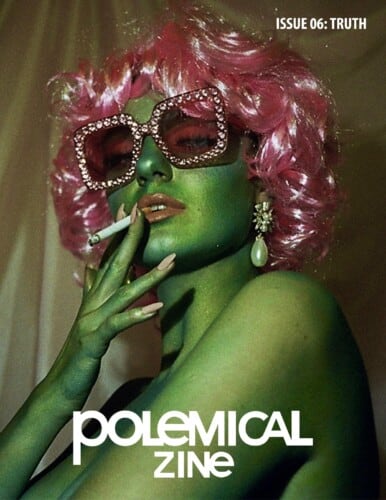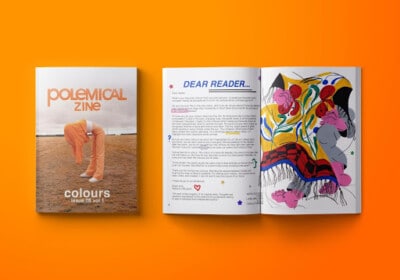Twenty-two-year-old Rebecca McLaren is the founder and editor-in-chief of Polemical Zine, a non-profit, global art publication that publishes submissions from all people, regardless of their age, gender, sexuality, ethnicity, geographic location, or skill level.
McLaren founded Polemical Zine in 2017, and despite being entirely volunteer-run, it has quickly made a worldwide impact with 336 contributors in 37 different countries and 9 staff members in 7 countries. They publish all art received (for free!) and have no jury or selection process. It is their mission to create a community where everyone can be an artist.
We chatted with McLaren about Polemical Zine this week.

SDTC: What’s your connection to the world of art-making?
RM: I’ve always loved to create—from gluing pompoms to paper plates at five years old, to abstractly painting my emotions on giant canvases and writing elaborate, half-finished romance novels in my teenage years.
Throughout my life, I’ve tried every medium I could get my hands on: drawing, beading, sculpting, sewing, photography—heck, even glass fusing! In elementary school, I went as far as taking lessons from a local artist in realism painting, but the pressures of perfectionism meant my pieces often went unfinished, and I was never happy with the end results.
After giving up on art for a few years, I revisited the concept in high school during a particularly difficult time. I needed an outlet for the emotions I was feeling, and I rationed that with abstract art, the end result wouldn’t have to be perfect; the only approval my work would need was my own.
I spent the next few years painting without thinking and selling abstract pieces to friends and family members who found beauty in the blobs and blurs of paint I haphazardly threw around. As I grew up, I began challenging myself to try new mediums and share my work without knowing if it was objectively “good” or “bad.” I started publishing my articles, writing poems without rules, and creating pieces for myself rather than for others.
I started falling in love with art again.
I think studying visual art at the post-secondary level and having grades assigned to my work would have undone the years of progress I made in learning to accept imperfection. Instead, I’ve kept art primarily as a hobby, and I’ve leveraged my creativity and my passion for storytelling to study media and business in university. In my personal life, I create pieces which I love and which tell my own stories, but in my professional life, I help other people tell their stories.
What have you been working on lately?
Lately, I’ve been working primarily in collage art. I find it fascinating that you can change the meaning of pre-existing content by cutting or framing it in certain ways and adding or removing from it, and I think collage is the most tangible example of that. It forces you to be creative and to look at objects and words in new ways. Plus, I love that two people can look at a piece of content and find completely different meaning based on their individual life experiences.
Who or what inspires your work?
I base a lot of my work on the inner dialogue of growing up and my own emotions surrounding suffering from mental illness, questioning my sexuality, and dealing with heartbreak. I like to free write and create without thinking too much about what I’m trying to achieve because when I’m engrossed in the process rather than the end result, art becomes therapeutic for me. I find peace in sharing the words which I wish I had heard when I was younger—to voice the thoughts people are afraid to say aloud and to create pieces which make them feel a little less alone.
What was the impetus behind starting Polemical?
I had been involved with various alternative magazines both as a staff member and as a contributor, and although they all aimed to create more inclusive spaces for artists, I found the structure of magazine curation itself was inherently exclusive.
Many magazines attempt to create opportunities for previously underrepresented voices, but their search criteria and aesthetic goals ultimately separate and exclude artists based on geography, skill level, style, and/or age group.

Why do you want to help artists get their work published?
I think artists of all backgrounds can benefit from working together. Obviously, capacity constraints make it difficult to service everyone, but I figured I could limit the number of submissions per person rather than exclude individuals entirely—with this in mind, the model for Polemical Zine became accepting two submissions per person, per issue, regardless of the artist’s age, gender, sexuality, ethnicity, geographic location, and/or skill level.
As an artist myself, I know how much pride can come from sharing your work. When Polemical Zine accepts and publishes a piece, we are validating both the artist and their art, and we are providing them with the opportunity to share and celebrate their talents with others. This is also why we respond to submissions with personalized words of encouragement—sometimes this can be just the push an artist needs to build their confidence.
Removing the jury process is central to Polemical. Why was this especially important for you?
I believe a juried selection process actually degrades the overall quality of a magazine. By introducing a jury, you can discourage people from pursuing art, from using their preferred artistic style, from trying new mediums, from sharing their work with others, and even from submitting their art in the first place.
A jury can limit the diversity of content that is published, making the magazine a reflection of only one small group’s artistic preferences and making it far less interesting to read. Removing the jury process was important to me because it meant helping artists share pieces that would otherwise go unpublished or unnoticed. It is disheartening to be told your art isn’t good enough to be accepted. Who am I to judge if something is good or bad? If you are proud of what you’ve created, I think you deserve to have it published. Besides, just because something may not fit my personal taste doesn’t mean it won’t be loved and appreciated by others.
Which artists have you discovered through this zine that you’ve been particularly impressed by?
I’m always impressed by the diversity of our artists. I am baffled each time I receive a piece from a new country, and I recently started colouring in countries on a map on our website so artists can see just how far their work is travelling. I remember one time I received a drawing from a five-year-old boy’s mother—that was really cool, because I knew just how excited he would be when he saw his work published.
I’ve also received quite a few submissions from artists who said they wouldn’t normally have the confidence to share their work or that contributing to Polemical Zine has given them the courage to submit to other publications. It’s messages like these which make me realize I have a real impact and that what I’m doing is so much more than just designing magazines.
How do you see Polemical growing in the next few years?
Polemical Zine started as a one-off online magazine filled with pieces from close friends and family members, and it has grown to represent over 400 contributors in 37 different countries.
After managing the publication on my own for two years, I felt like it had become so much bigger than myself. So last month, seven talented volunteers from around the world joined—eager to help take Polemical Zine to new heights. With their diversity of thought and belief in our mission, I am excited about what we can accomplish moving forward to provide even more opportunities to global artists.
Right now, the team and I are working hard to release our tenth issue, Sweet, and our call for submissions has opened for our eleventh issue, Social. We also have a brand-new website, which includes a forum for artists to find and secure art collaboration opportunities.
In the next few years, I believe Polemical will undertake similar projects to become a community rather than just a magazine. We have a podcast in the works which we plan to start releasing alongside each issue, and we’ll continue to leverage different publishing platforms to make artistry more accessible to a global audience.
Anything else we should know?
Despite what any magazine, teacher, or curator tells you, you are an artist, and you have inspirational stories and ideas which the world can benefit from. If you’re interested in publishing your work—even if you haven’t created art before—we would absolutely love to have you as a contributor.
To keep up to date with calls for submission or to read our magazine, check out our website or find us on Issuu, Instagram, Facebook, and LinkedIn.



 Follow Us On Instagram
Follow Us On Instagram
